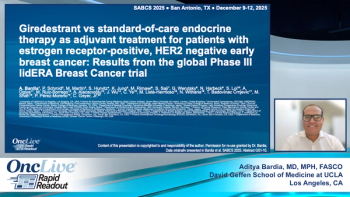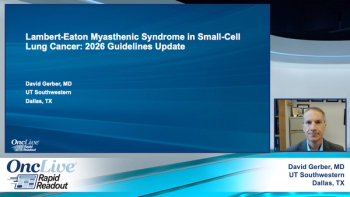
|Videos|October 7, 2021
Rapid Readouts: ODENZA trial
Dr Zhang, MD, discusses cognitive assessment data from patients with metastatic castrate-resistant prostate cancer in the ODENZA trial receiving either darolutamide or enzalutamide that was presented at the European Society for Medical Oncology 2021 Annual Meeting.
Advertisement
OncLive® Rapid Readout from European Society of Medical Oncology 2021: Results from ODENZA Trial
Segment Description:
Tian Zhang, MD, discusses data from the following presentation: “Objective Computerized Cognitive Assessment in Men With Metastatic Castrate-Resistant Prostate Cancer (mCRPC) Randomly Receiving Darolutamide or Enzalutamide in the ODENZA Trial.” (
Segment Body Content:
- ODENZA (NCT03314324) is a prospective, cross-over, preference, randomized phase 2 trial of darolutamide and enzalutamide in patients with mCRPC.
- Methods
- Patients (n = 249) were randomized 1:1 to receive darolutamide 1200 mg daily for 12 weeks followed by enzalutamide 160 mg daily for 12 weeks or the reverse sequence.
- Cognitive assessment using computerized cognitive tests (Cogstate) was a key secondary end point of ODENZA.
- Cognitive tests were prospectively realized by patients with laptop and questionnaire.
- Changes from baseline were described by assessing each 12 weeks period.
- Individual tests (detection test: psychomotor function; identification test: visual attention; one-back test: working memory; International Shopping List Test (ISL): verbal learning; International Shopping List Test Delayed Recall (ISRL): verbal memory; Groton Maze Learning: executive function) were used and 3 composite scores (eg ISL/ISRL for episodic memory) were created.
- Treatment effects were analyzed using Mixed-Effects Model Repeated Measures.
- Effect sizes were classified as clinically meaningful when greater than or equal to 0.5.
- Results
- Cognitive data were available in 193 patients among 250 patients enrolled in ODENZA trial.
- Performance on verbal learning (ISL) was significantly better with darolutamide at each of the postbaseline assessments, within both periods and when averaged over periods.
- Effects were clinically meaningful at the second period (0.62, P = .0001) and overall (0.54, P < .0001).
- Performance on verbal memory (ISRL) was significantly better with darolutamide at the second period and when averaged over periods
- However, the effect sizes were less meaningful (second period: 0.4, P = .01 and overall: 0.29, P = .0075).
- No difference in other tests was found. The composite scores reported a moderate benefit in episodic memory after treatment with darolutamide compared with enzalutamide.
- Conclusions
- In early mCRPC, darolutamide was associated with a statistically significant benefit in verbal learning and verbal memory compared with enzalutamide.
Advertisement
Latest CME
Advertisement
Advertisement
Trending on OncLive
1
Long-Term Cilta-Cel Data Show Low Rates of PFS Events in Standard-Risk R/R Myeloma
2
FDA Updates Axi-Cel Label to Remove Limitation of Use in R/R PCNSL
3
Real-World Data Support Clinical Benefit With Lifileucel in Previously Treated Advanced Melanoma
4
Nonresponse to Bridging Therapy and Peak ALC After Cilta-Cel Are Associated With Neurotoxicity, NRM in Myeloma
5




































